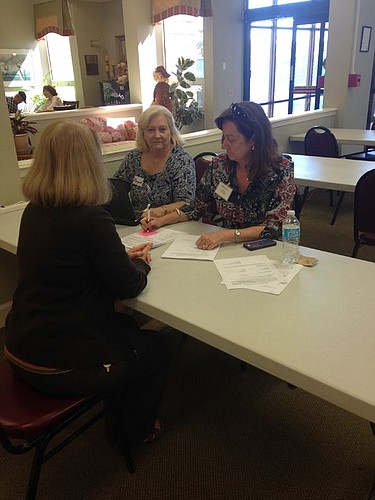
It’s more than a document. It’s peace of mind.
We can all agree that getting advance directives in place is more than completing a questionnaire. It’s making important decisions, stating preferences and designating spokespersons.
It’s making plans for life and death, insuring those we trust are able to collaborate with health care providers and tend to financial matters on our behalf.
On Oct. 25 at Pablo Towers, a HUD-subsidized senior citizen residential facility, 26 seniors completed their advance directives documents. Typically, the volunteers at these events serve 12-15 seniors. Providing service to 26 raised the bar.
In addition to completing advance directives, some residents also consulted with an attorney to determine whether to create a will.
The on-site advance directives legal services are accomplished in two days. On the first day, an attorney presents information on the purposes of each advance directive document: durable power of attorney, designation of health care surrogate, living will and designation of pre-need guardian.
Those seniors who would like to create the documents make an appointment for the second day.
On that day, the team of volunteers assembles with laptops, notary stamps, printers, thumb drives and a scanner. Seniors meet with an attorney-paralegal (or law student) team and at the end of their appointment, they leave with a complete set of advance directives.
These attorneys provided this valuable service: Angela Grewal, Pat Vail, Cyndy Trimmer, Brittany O’Neil, Daren Anderson, Imani Boykin, Debbie Lee-Clark and Robert Morgan.
Working with the attorneys were these paralegal and law student volunteers: Lisa Hunt, Cara Dickinson, Cecil Grant, Linda Murphy, Bobbi Austin, Margaret Costa, Donna Jones, Sophia Davis and Donna Hoffman.
The Service Coordinator at Pablo Towers, Ellen Hopkins, scheduled the appointments, arranged the meeting space and helped the residents prepare for their appointments.
Hopkins remarked, “What an amazingly flexible and gracious team. We started with 16 residents scheduled but as more showed up requesting the service, the volunteers stepped up and served every single one. We are deeply grateful.”
The seniors over and over again also expressed their appreciation: “What a blessing you are. Thank you for being here and for doing this for us.”
Advance directives documents are more than pieces of paper. They are peace of mind.
Attorneys interested in pro bono opportunities throughout the 4th Circuit are encouraged to contact Kathy Para, chair, The JBA Pro Bono Committee, at [email protected].